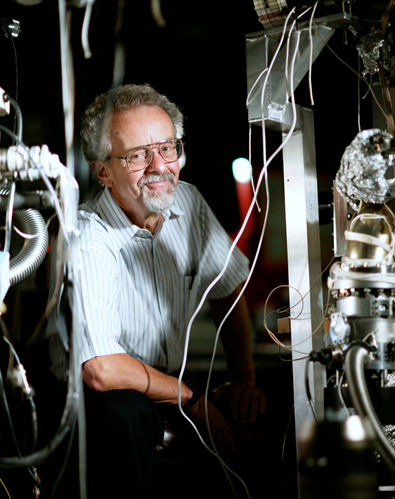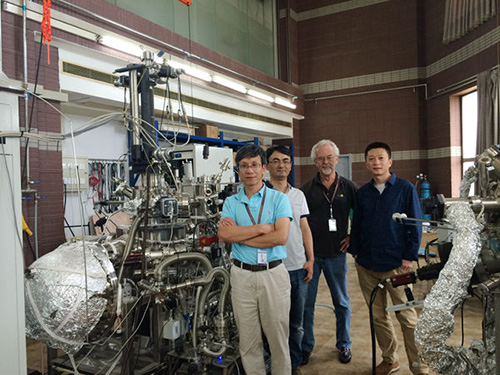 |
| US scientist Earl Plummer is both a contributor to and witness of China's rapid development in quantum physics. He has worked closely with Chinese experts and institutes over the past decade. [Photo provided to China Daily] |
US physicist Earl Plummer sees a bright future for China's further progress in science. Liu Xiangrui reports.
Next-generation electronic devices are receiving attention worldwide, and Earl Plummer says, he is happy that a decadelong collaboration with Chinese organizations has contributed to the sector's growth in the country.
Plummer, a professor at the Louisiana State University, specializes in the study of quantum phenomenon, and his research in the development of advanced observation methods, such as that for tunneling spectroscopy, have enjoyed international recognition.
Quantum physics is a field that relates to the study of atoms and subatomic particles.
The 77-year-old scientist from the United States has published more than 400 writings on his research that are frequently quoted by other scholars.
He has been both a member of the US National Academy of Sciences and a fellow of the American Academy of Arts and Sciences.
Plummer's exchanges with Chinese scholars began early in his career. A considerable percentage of his PhD students and postdoctoral fellows in the US were Asians. Half of them have returned to Asia, primarily China, he says. This exchange created lifelong partnerships between him and Chinese scholars.
In 2000, he was invited through a former Chinese friend to be the chief scientific adviser for the then newly founded International Center for Quantum Structures at the Institute of Physics under the Chinese Academy of Sciences. Since then, he and other distinguished international researchers have also been invited to come to China once a year to advise and collaborate with the institute.
Thanks to his active coordination and support, ICQS also brought together a good number of top young Chinese scientists, many of whom have now become leading figures in the academic community, laying a solid foundation for advancing the country's research capabilities in such fields.
ICQS became such a success that it was later used as a model by some top Chinese universities and the collaborations have also been expanded to include other universities in the US, too.
"I have never seen in my career a program that was so successful as this," Plummer says.
According to him, the cooperation has benefitted both sides on the long run, especially young scientists from both countries.
"In the beginning, the benefit was primarily for the Chinese, but as time went by we (US collaborators) truly benefited," he adds.
His connection with and fostering of scientific leaders in China has assured a constant stream of talented scholars working in his US laboratory.
He has also had the chance to win sufficient funds for his research programs in China and has been able to build or use world-class equipment that are not available in the US.
"It (the collaboration) has really grown, and the interaction gets stronger every year," says Plummer.
 |
| US scientist Earl Plummer is both a contributor to and witness of China's rapid development in quantum physics. He has worked closely with Chinese experts and institutes over the past decade. [Photo provided to China Daily] |
He has made great efforts in bringing practical science-related experiences and traditions from the West to China, but also urged Chinese institutes, including the Institute of Physics, to create their own methods to develop science, according to Guo Jiandong, a professor at the institute and a former student of Plummer.
"He is a leading figure in the field of condensed matter physics internationally. His advice and support have been very helpful not only for me personally but also for the enhancement of science as a whole in China," says Guo.
In recent years, Plummer has made annual visits to China, staying about a month each time, collaborating with Chinese scientists, giving lectures and workshops and participating in the cultivation of talent.
He has made efforts to help the Chinese Academy of Sciences build a talent pool of professionals with an international vision.
He has also expanded the cooperation to more Chinese organizations.
For example, he has served as a foreign adviser at the High Magnetic Field Laboratory under the Hefei Institutes of Physical Science in East China's Anhui province.
"I intend to make it (collaboration with China) grow in the future," says Plummer.
He says he has observed China's progress in science and is glad that the Chinese Academy of Sciences is placing emphasis on fostering creativity among Chinese students in various institutes.
Plummer believes that the future of science in China lies with young people, and suggests that the "government should identify the really talented people, and give them the resources to shine".
Over the years, he has been making efforts to deepen the collaboration between Chinese institutions and his US university both in research and talent nurturing.
He has guided an international team with members mainly from the Institute of Physics of the Chinese Academy of Sciences, and the team has published nearly 30 papers in international journals, including Science. The program has helped nurture many young scholars.
His university in the US has established a dual-degree program, which allows Chinese students from two partner institutes in China to study in the US and vice versa. The program will expand to five or six Chinese universities in the next couple of years, Plummer says.
In September, he was given the Friendship Award by the Chinese government. The award is the highest honor given to foreigners who have made important contribution to China's social and economic development. Plummer also won the 2016 CAS Award for International Scientific Cooperation.
Contact the writer at liuxiangrui@chinadaily.com.cn
